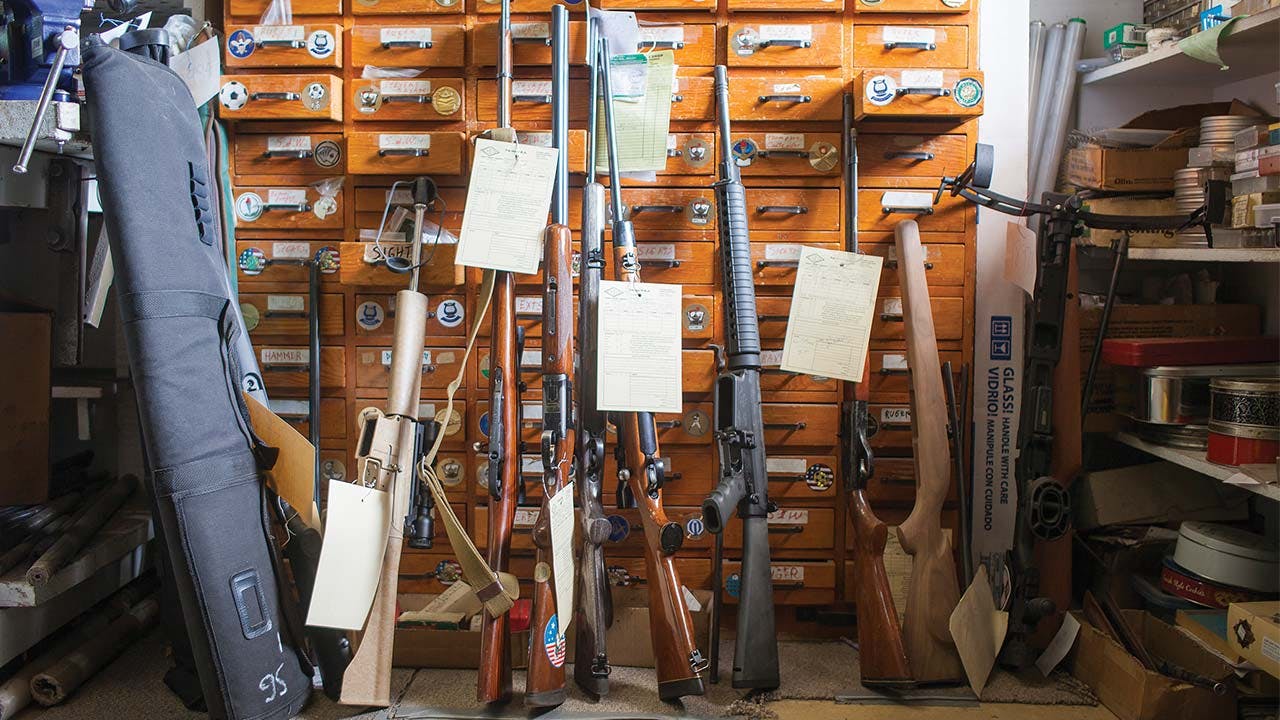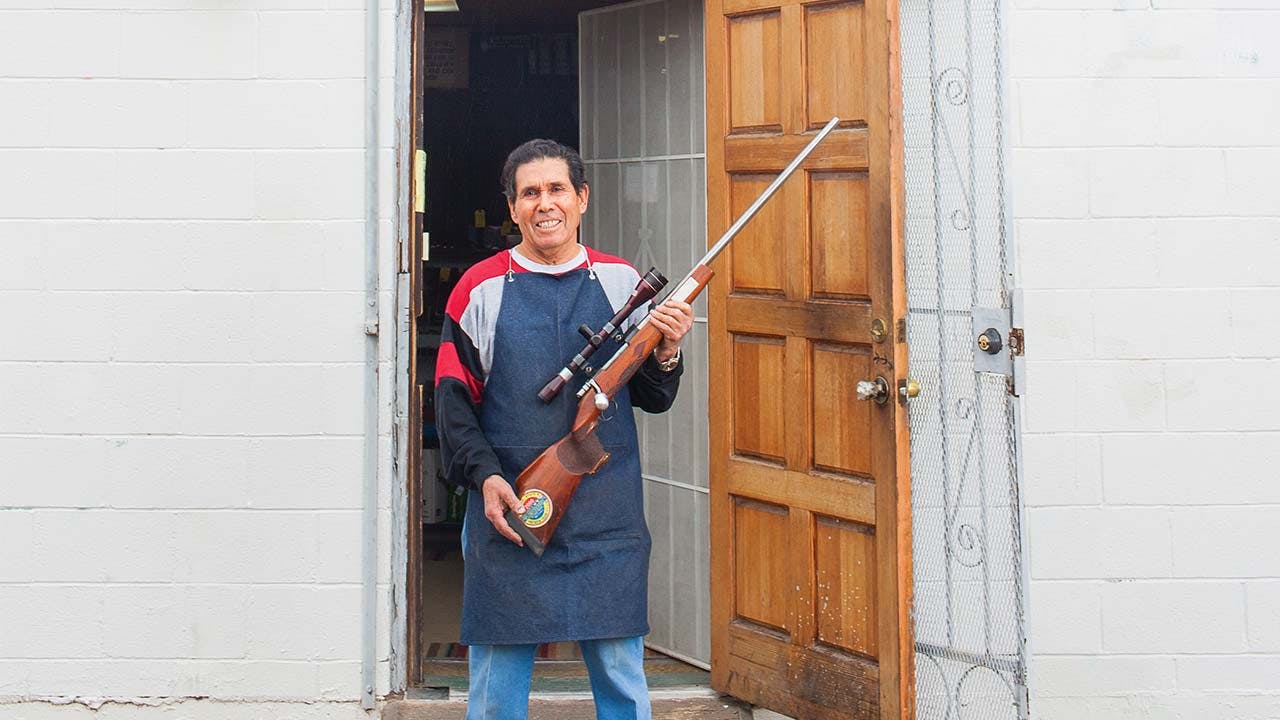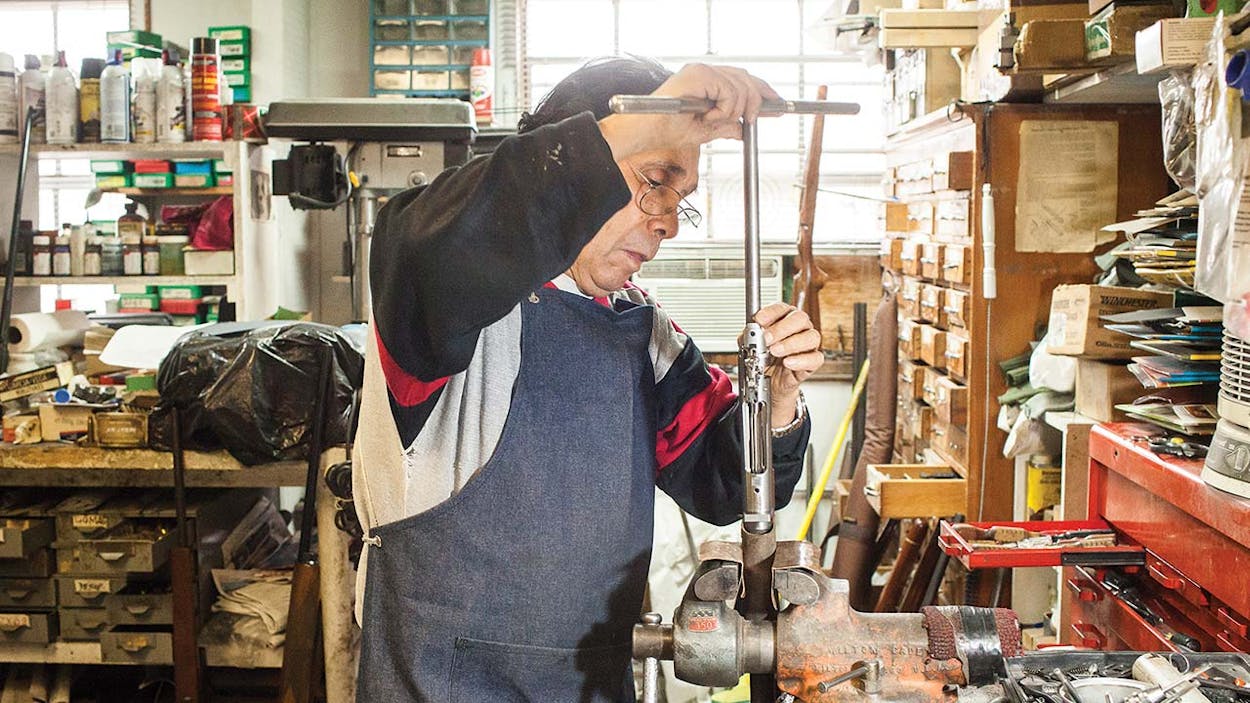At five minutes after 4 p.m., the temperature gauge in my car reads 104 degrees. It’s August in El Paso, and Chuy Aguirre is late; the handwritten sign on his shop’s front door says he keeps hours from 4 to 6, but the place is locked, and no one seems to be around. A few minutes later a big white Crown Vic pulls up. Though we’ve never met before, the driver waves as if we’re old friends, gesturing for me to wait as he gets out of his car and shoves an ivory-handled Colt Commander .45 into the back of his pants. He opens the door to the shop and allows me to pass through the entrance first. Inside it’s darker but not much cooler.
Despite the dim lighting this slight man with jet-black hair that belies his 73 years knows how to find every nut, bolt, or scrap of paper he might be looking for. For more than half a century the proprietor of Chuy’s Gun Shop has fixed the guns of the famous and the anonymous alike. Jesus “Chuy” Aguirre is a master gunsmith, perhaps the only full-time master gunsmith for hundreds of miles in any direction.
I explain that my needs are simple: I want him to thread the barrel of my old Winchester 1200 12-gauge pump shotgun, so that I can shoot tight spreads for ducks, wider spreads in general, and big spreads for smaller birds, like dove and quail. Dove season is just around the corner, and I’m eager to get the gun back as soon as possible.
Chuy is unfailingly polite and humble—he peppers his speech with countless “Thanks be to God”s—but he’s also workmanlike to the point of being firm. He examines the gun and, as I grimace inside, explains that the job could take four weeks. He measures the thickness of the barrel and decides it’s fine for him to machine the threads. He notes that it’s already an open choke, with the broadest spread, so he’ll need to order only two choke tubes, the modified and the full. He carefully records the serial number, checks my ID, writes me a receipt, and props the gun in the corner. That’s when I notice: he has dozens of orders ahead of mine. Rifles and shotguns are piled all over the place. He knows what I’m thinking. “Don’t worry,” he says. “When I get tired of something, I put it aside and work on another gun.”
At one time, a skilled artisan who worked on walnut and steel was a common fixture in every town. But in the early twentieth century smiths were replaced by factories, and the trade began to dwindle. Now there’s little money in smithing; few schools still teach it. When you walk into a gun shop that advertises a gunsmith on-site, you’ll discover that he or she will most likely just replace one part with another—not fashion a checkered stock from raw material, let alone make a gun from scratch. Standing in Chuy’s shop, you can look around and see the loss this signifies. The scent of oil, wood, and steel is intoxicating.

Mexico is one of the most heavily armed countries on earth, as befits a nation that has fought numerous wars and rebellions on its own territory. Many of the combatants of those struggles were civilians, who needed guns to defend themselves, and many of those guns are still in circulation today.
It is out of this history that Chuy emerged. Born in a small town in Chihuahua in 1942, he moved with his family from place to place, following his grandfather, who worked on the railroad. In the Chihuahuan countryside he learned to hunt rabbits with a slingshot. At the age of eleven, he learned to fire a rifle. Once, while hunting, he stumbled upon a big rattler and killed it with a single-shot Stevens .22.
After settling in Juárez, in 1960, where he worked unhappily as an auto mechanic and construction laborer, he decided to find a vocation that he liked. Through his mother’s connections he got hired at a gun shop called Armeria Flores. There he apprenticed for 25 pesos every other week under Don Emeterio Flores, “El Maestro.” “He was good,” Chuy recalled. “And he’d never been to school for it.” A black and white photo of Chuy from 1964 reveals an earnest-looking young man in an oil-stained smock. That year, his country called, and he was drafted into the peacetime reserve. “I was proud to serve,” he wrote five years ago in his self-published memoir, Rio Grande Gunsmith. “But I felt very confident I had found my calling.”
By the seventies, he had finished his reserve duties and had left Mexico altogether, living in El Paso with his new bride, Maria de los Angeles, a U.S. citizen, and moving from gun shop to gun shop. At the last he worked under a master gunsmith. There he was handed a model 1894 Winchester rifle and a walnut blank and instructed to fashion a duplicate of the gun’s stock. It took weeks of intense effort, repeatedly applying linseed oil while checkering the stock—hand-carving tiny, interlocking, precisely matched hash marks. The result, his boss said, was acceptable. He had passed the test.
As we talk, a young soldier comes in the door. He’s just back from a rotation in South Korea and inquires about replacing the trigger housing on a shotgun. Chuy scribbles down the model number and then disappears into the back to consult a parts catalog and draw up an estimate. After he returns, the soldier says thanks and heads back out into the blazing afternoon. Chuy picks up his story again. In 1976 he became a citizen of the United States. That same year he started work at the Buffalo Hunter Gun Shop and won some local shooting competitions. Then, a year later, his adopted country arrested him.
In June 1977, he explains, a friend and customer, Nolan Carter, called and asked him to swing by his house after work. When Chuy showed up, he saw, to his shock, that Carter was trying to convert an M1 semiautomatic into a fully automatic weapon, which was against federal law. Carter said he needed a certain spring to finish the job for a mystery man known only as “Gary.” Chuy explained that he couldn’t make the spring to the needed specifications; at best he could fashion a shorter, weaker spring. But he refused to do so and left.
Months later, “Gary” appeared at the shop, a .45 on his hip, and demanded the spring; Chuy said it wouldn’t work because it wasn’t heat-tempered, and though he grudgingly handed it over, he refused payment. Eight months later, the Bureau of Alcohol, Tobacco, and Firearms took Chuy into custody. Along with Carter and a third man, Chuy was charged with conspiracy to manufacture machine guns. “Gary” was an undercover federal agent; he had spent two years trying to make a case against Carter. At the jailhouse, cops and agents taunted, “Chuy, smile for your picture.” “I was about to explode with anger,” he recalls. “But I somehow controlled myself.” He pleaded not guilty and was released on a $1,000 bond.
During his trial, the case against Chuy came down to this: Did he knowingly furnish a part that would convert a semiautomatic weapon into a fully automatic weapon? Chuy insisted he had not; the spring he had manufactured would inevitably fail, just as he had told Gary. The court recessed, and Chuy and a small party of agents and lawyers drove to the El Paso Police Department’s firing range. There, a U.S. marshal tested the rifle, and just as Chuy had predicted, the makeshift spring immediately failed. Chuy was acquitted.
Back at his job a few months later, the owners of the shop, out of admiration for his skills, replaced their “Gunsmith” sign with one that said “Master Gunsmith.” That sign hangs in Chuy’s shop to this day.
Chuy’s Gun Shop opened in 1998 on a residential street in the northeast corner of El Paso, far from everything except Fort Bliss. On the walls hang an array of National Rifle Association posters—“The more I hear the news, the more I like my guns” and “Criminals don’t fear the law but they do fear the armed citizen.”
Many of his customers are referred by gun stores around town. “Call Chuy,” Sportsman’s Elite on the West Side told me when I explained what I needed. Many of his customers are soldiers, cops, and federal agents. One came in with a 9 mm that had jammed so badly that the round was stuck in the chamber—facing backward. And, of course, there have been the famous: Chuck Norris wanted a custom .44. The cast and crew of the 1982 Jack Nicholson movie, The Border, signed a photo of his workbench after he spent weeks taking care of the guns used in the movie. Susana Martinez, the governor of New Mexico, was recently given a signed copy of his memoir. “But the thing I enjoy the most is working on a gun that is being handed down from father to son,” he says. “Or when someone comes into my shop for years and says I’m the only one he has ever allowed to touch his gun. I feel very, very thrilled.”
The amount of training required to become a gunsmith is daunting: gunsmiths have to know woodworking and machining, certainly, but also cleaning, refinishing, reloading, and customizing—and demonstrate a close familiarity with countless weapons. It can take two years of training at a trade school—there are only a handful, none in Texas—to be awarded an associate’s degree as a gunsmith. And the pay, at the top end, is about $40,000 a year. “There’s not a lot of money in this,” Chuy says.
Then again, today’s guns aren’t built to be repaired, really; broken parts are supposed to be thrown away and replaced. Many guns are so inexpensive it’s cheaper to toss them out and buy new ones, as if they were toaster ovens. Many are manufactured with lots and lots of plastic.
There are still a few master gunsmiths in the state, on the back roads of small East Texas towns like Kemp and Magnolia, and in the big cities as well. Climb the stairs at McBride’s Guns, in Austin, and you ascend into a scene straight out of the early sixties: middle-aged and older men staring through thick spectacles at firearms broken down into their requisite pieces. Though they give off the appearance of craftsmen, they are, in their unpretentious way, artists of a sort.

Two—not four—weeks after our conversation, Chuy calls to say the Winchester is ready to go. I have to leave town soon after picking it up, and he remembers to mail me the additional chokes while I’m traveling. By the opening of dove season, they arrive and the gun gives a powerful zing as the pellets leave the barrel. People like me will miss people like him.
Time is ticking down on Chuy and his gun shop. His federal firearms license has just two years to go on it. His family is urging him to retire. “No, no, not yet,” he says. He quotes, inexactly, the Mexican poet Amado Nervo, “I have been the architect of my own destiny and I am at peace with my life.” Still, he’s not sure about renewing his license, and he has no real apprentice; his three children are grown and have gone on to their own pursuits, none of which involve gunsmithing.
I ask him what’s next. He laughs and responds that honey-do’s and shooting at the Ysleta Gun Club twice a month are definitely in his future. “I’ve had the good fortune to enjoy what I’ve done with my work, with my hands, thanks be to God,” he says. “I know there will be a lot of enjoyment in everything I have left to do.”







